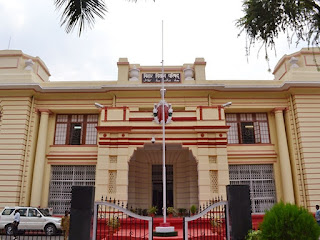Resentment against hike in bus fare mounting in Bhopal


 |
| Bihar Legislative Council |
NK SINGH
Patna: In Bihar democracy has acquired a new prefix -- 'nominated'-- thanks to the powers that be in the state.
The costly game of (fake) elections is staged only to dupe the masses. To use the words of dissident Congress leader R. L. S. Yadav --"the bogus voters are nearly double the genuine voters."
Recently the Election Commission had to postpone the elections to the Bihar Legislative Council from several Graduates' constituencies pending revision of the electoral roll as there was strong resentment from several opposition parties.
A local daily, the Searchlight, alleged that the electoral rolls of most of the constituencies included a large number of ghost voters.
The inquiry conducted by the Election Commission revealed that out of a total of 29,000 votes from the Patna Graduates' constituency, as many as 18,000 were found to be fictitious, which comes to about sixty per cent of the total electorate.
The most interesting part however, is that such anomalies were detected despite full-fledged revision of the electoral rolls!
According to informed sources, the problem of the total revision of the rolls (as in the case of the Patna Graduates' constituency) arose for the first time in the country.
The applications of all these bogus voters (either non-existent or non-graduates) were endorsed by either member of Parliament or State Legislature or gazetted government officers.
Several thousands of such applications have been seized by the authorities to examine their contents and to decide whether legal action could be taken against those who made false statements and also against those who endorsed such fraudulent applications.
But this is only half the story.
Democracy has acquired a new dimension in Bihar -- 'nominated democracy'.
A large number of persons (between 500 to 1,000) were nominated to the various local self-governing bodies just before the election to the State Legislative Council.
Such was the high rate of nominations that in some places the nominated members were double the elected members. All this to ensure smooth sailing for the ruling party's candidates!
When the matter was being heatedly debated in the Bihar Legislative Assembly, Speaker Harinath Mishra ruled that "nominations by the Government just before the elections is a grave matter."
However, not satisfied with the Government's answer the opposition parties staged a walk-out against the "undemocratic, unjust and irregular" step of the ruling party.
No wonder, the ruling Congress secured eight out of the eleven seats in the recent election to the Legislative Council from the Local Authorities constituency.
The same story was repeated in the general elections, too.
For example, in the 1952 General Election, only 44.90 per cent of the total eligible voting population was registered by the Election Commission in Bihar. In the 1957 election, the figure increased by 47 per cent, which remained static in 1962.
The situation improved in the 1967 election when the figure soared to 59 per cent. However, it again registered a fall in 1969 58.95 per cent. In the 1972 mid-term poll to the State Assembly, 59 per cent of the total eligible voters were on the list.
In the 1952 General Election, only 39 per cent of the total registered voters exercised (or for that matter someone else exercised on their behalf) their right to franchise.
In 1957, 41 per cent, in 1962, 46 per cent, in 1967, 50 per cent, in 1969, 51 per cent and in 1972, 44 per cent of the voters cast their votes.
A closer scrutiny of the 1972 mid-term poll of the Bihar Assembly provides an interesting case study.
Of the total eligible voting population, only 59 per cent was registered by the Election Commission. Of these 59 per cent, only 44 per cent exercised their right to franchise, which comes to nearly 27 per cent of the total eligible voting population. Of these 27 per cent, only 34 per cent stamped the cow and calf.
Congress received the support of only 7.25 per cent of the total eligible voters.
THE CURRENT
3 June,1972
Comments
Post a Comment
Thanks for your comment. It will be published shortly by the Editor.